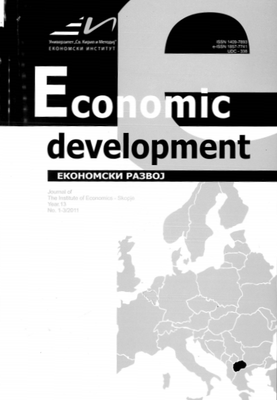Contribution of organic agriculture for Balkan regional cooperation
Contribution of organic agriculture for Balkan regional cooperation
Author(s): Katerina Hadzi-Naumova Mihajlovska, Natasha DaniloskaSubject(s): Economy
Published by: Економски институт - Скопје
Keywords: organic agriculture; Balkan region; regional co-operation; sustainable regional development; environmental sustainability
Summary/Abstract: Economic transition in the countries of Balkan Region caused rather drastic changes of agricultural sector and resulted with large price disparity between the agricultural outputs and agricultural inputs. Low-input traditional systems and small-scale labour intensive farming are the main attributes of the agricultural production in the Balkans. Low-input farming refers to reduction of external agricultural inputs (typically fertilizers, herbicides and pesticides) or refrains from using them altogether. This simple reduction of agro-chemical inputs should be considered as the consequence of a socio-political evolution from central planned to market economy and not as the result of a designed agricultural policy. Only because the low-input traditional systems are organic by default, that is, those do not use synthetic external agricultural inputs, not necessarily leads to an organic and environmentally friendly production. Quite contrary, currently, the majority of agricultural production in the Balkans is far away from being sustainable and organic, either from economic or environmental aspect.Potential specific contribution of organic farming to some of the key agricultural policy objectives in each of the Balkan economies, such as competitiveness of agriculture, farm income, food supply, food quality aspects and minimization of negative environmental impact of agricultural production, needs to be discussed on regional level. These issues should be the main drives raising the Balkan policy makers’ interest in organic agriculture and its benefits that are relevant for policymaking and sustainable regional development. Currently, on the Balkans there are EU-member countries Greece, Slovenia and Bulgaria where organic agriculture is rapidly developing and the supporting institutions structure (regulation, inspection, certification, market, research and education) are established and the activities are completely performed under EU regulation for organic farming (Council Regulation (EC) No 834/2007). Then, there are Balkan EU-candidate-Macedonia and Croatia, where organic production and marketing, as well as regulations, inspection, certification and education system is still not properly functioning, but is emerging. At the end, there are Balkan EU potential candidate countries-Montenegro, Serbia, Bosnia and Herzegovina, Albania, Kosovo under EU Council Resolution 1244, where organic agriculture is still at a relatively low level and where any help and experience are welcomed. In such a situation, it is more than obvious what benefit will bring exchange of experience and regional co-operation.
Journal: Економски Развој - Economic Development
- Issue Year: 13/2011
- Issue No: 1-3
- Page Range: 67-77
- Page Count: 11
- Language: English

